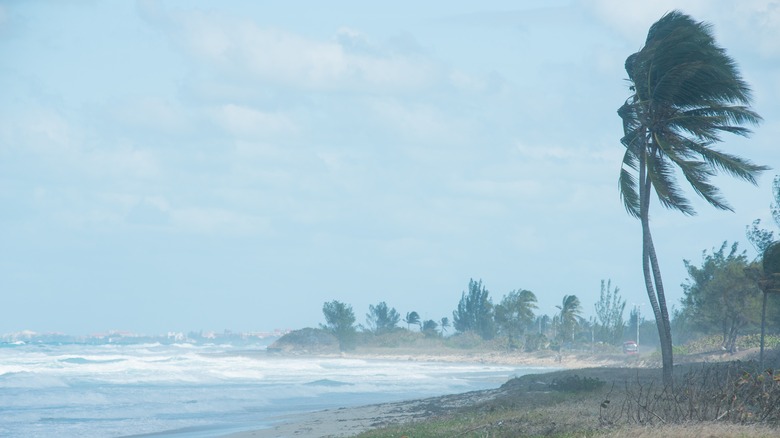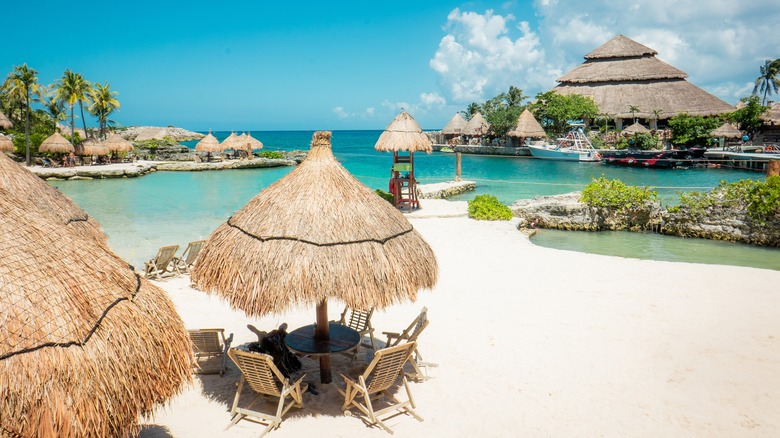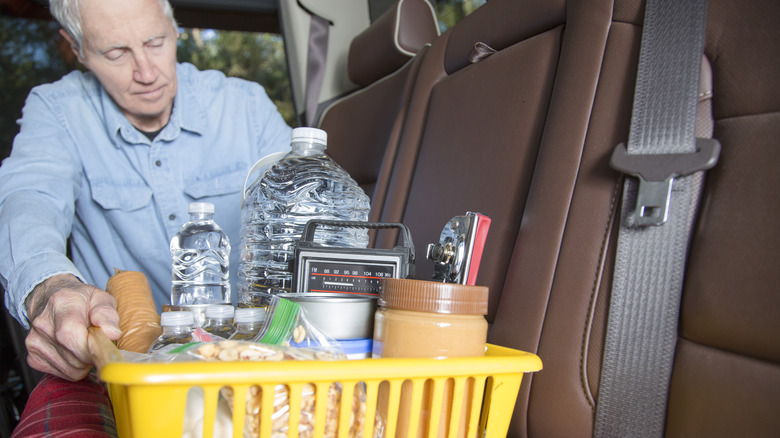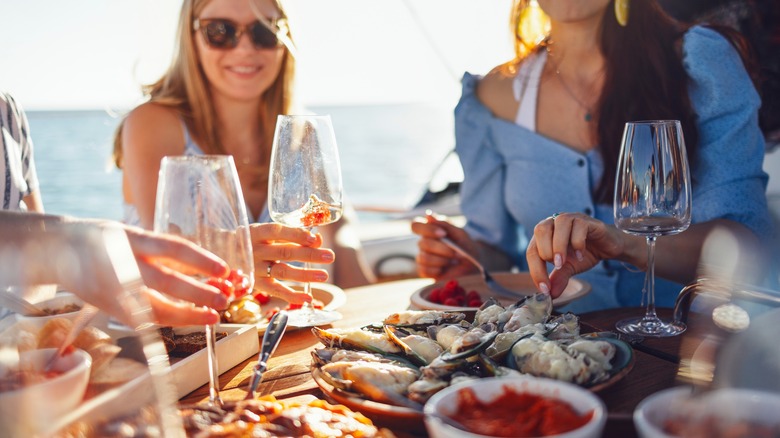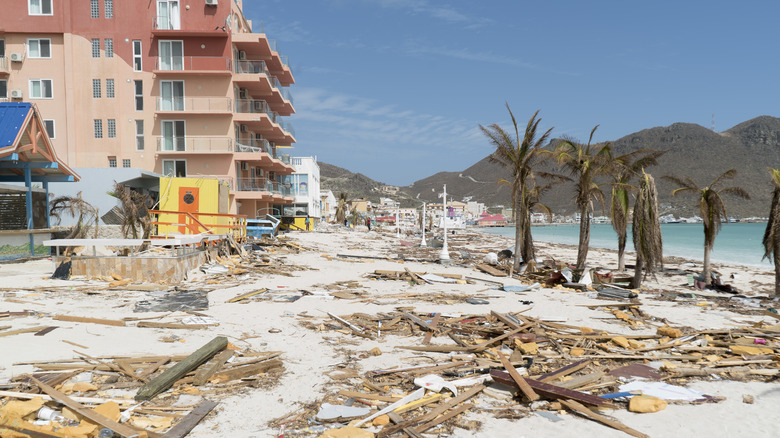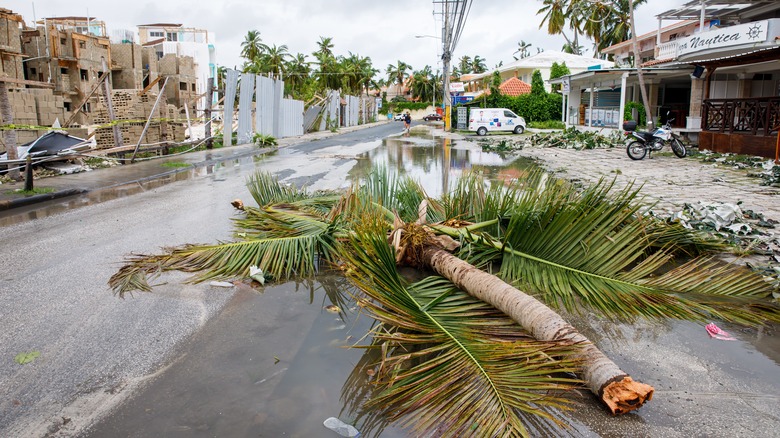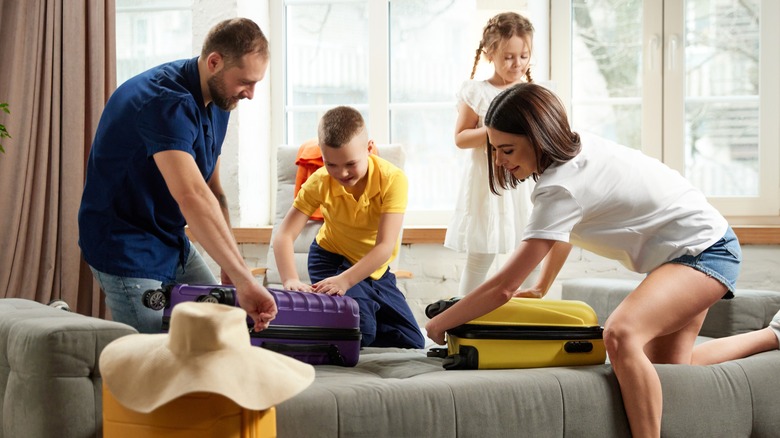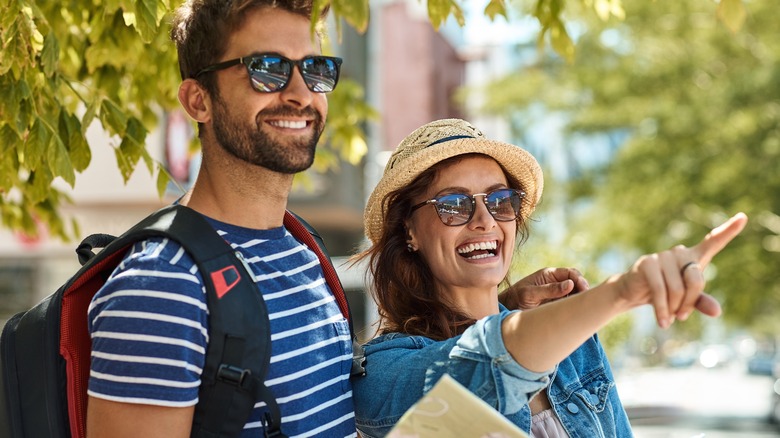Crucial Things To Know Before Taking A Caribbean Vacation During Hurricane Season
Planning a Caribbean getaway is exciting. Visions of turquoise water gently lapping against the shoreline are undeniably wafting through your mind — not to mention the promise of sunny days and balmy nights spent dining on your balcony or at a chic seaside eatery. It's enough to make anyone whip out their calendar and check their schedule for open travel dates.
At the same time, planning that getaway during hurricane season can pose a significant danger. The season, which runs from early June to late November, dominates a significant part of the year. If your only available travel time occurs during that period, are you really out of luck? The answer — maybe surprisingly — is no. In fact, since peak hurricane season falls between August and October, you could conceivably find a way to travel outside of that time. Even if there's a chance that you can't do that, there's good news: Traveling to the Caribbean during hurricane season isn't always a risk.
In fact, there are quite a few perks associated with it. Yes, there are fewer people, but you'll also enjoy other benefits, like better rates. If you're hoping to save some money, this is definitely one way to enjoy the beauty of the Caribbean without dipping too deep into your bank account. Embracing the spontaneity of the season can also lead to many unique experiences — but you won't know unless you try. Here's what you need to know if you're planning to visit the Caribbean during hurricane season.
Traveling to the Caribbean during hurricane season offers benefits
If you're hoping to dodge the usual Caribbean crowds, hurricane season presents a golden opportunity to explore the region without the chaos. As this is the low season, you can expect fewer lines at popular attractions, reduced wait times at popular restaurants, and far quieter beaches. This cultivates a far more laid-back, relaxed experience, making it easier to soak in the beauty of the Caribbean without the added noise.
Beyond that added peace and quiet, the potential to save big is another significant draw. During hurricane season, many airlines, hotels, and resorts offer substantial discounts to attract visitors. These deals may extend to everything from spa packages to dining opportunities, making it an especially ideal time for more budget-conscious travelers to explore the Caribbean without breaking the bank. You may also find last-minute offers or even opportunities to upgrade that would otherwise be harder to enjoy during other times of the year.
The key, though, is to be mindful of flexible booking options. These are commonly offered at this time of the year, so you can have some freedom to adjust your plans accordingly if the weather has plans of its own. Keeping an eye on the weather and tourism sites is smart — as is subscribing to your preferred hotel and airline lists so you'll be aware of any specials that might be ongoing.
Not every location is hurricane-prone even during hurricane season
Just because you're headed to the Caribbean during hurricane season doesn't automatically mean you're going to encounter a ferocious storm. In fact, some areas are relatively immune to rough weather, according to Daniel Marmontello of CheapCaribbean.com. He told the Travel Channel, "There are some islands that haven't had a hurricane in 10+ years like Turks and Caicos, though they are situated within the belt and have the same risk, however unlikely, as other Caribbean islands."
Marmontello recommends choosing islands outside of the hurricane belt to minimize your risk. Among the safest, least likely Caribbean islands to encounter severe weather conditions are Barbados, Trinidad, Grenada, and Aruba. "The ABC (Aruba, Bonaire, & Curacao) islands truly are some of the least likely to have bad weather in the Caribbean during hurricane season," Marmontello added. Just how safe are these islands? For context, when Hurricanes Maria and Irma struck the Caribbean in 2017, the islands outside of the belt weren't affected.
As a general rule of thumb, you can usually feel confident that you'll enjoy a hurricane-free trip if you book outside of the belt, stay on one of the "ABC" islands, or stick closer to the southern Caribbean.
It's smart to buy travel insurance during hurricane season
It's smart to invest in travel insurance during hurricane season. The cost can vary based on your age and the total cost of your vacation. For a comprehensive policy, you can generally expect to pay between 4% and 10% of the trip's cost. Adding upgrades like "cancel for any reason" (CFAR) coverage will increase the premium — but improve your flexibility too, so it might be worth it.
Ideally, choose a trip-cancellation insurance plan so you're fully reimbursed for anything you paid for in advance or that is non-refundable, like flights and hotel stays. To qualify, your claim needs to meet specific criteria, like a current hurricane warning or evacuation order. If you're stranded due to a flight delay, it's possible that your policy might cover the cost of necessary accommodations and meals. Medical coverage for any unexpected illnesses is usually included too.
There are some caveats to keep in mind, though. Some policies won't kick in if you purchase insurance after the storm has already been named, so it's a good idea to buy the policy well in advance. Aon Affinity Travel Practice president Beth Godin told Forbes Advisor, "You get the longest length of time for cancellation benefits at no extra cost, and it's not going on sale, so what are you waiting for?" Be sure to check the fine print so you know exactly what is (and isn't) covered.
Make sure you're ready for potential hurricane season emergencies
"Better safe than sorry" is absolutely the adage to adhere to when preparing for a Caribbean vacation — especially if you're going during hurricane season. In this case, you'll want to make sure you're prepared for an emergency situation that calls for swift action. As anyone who's ever experienced a hurricane can attest, a "go kit" is essential, coming in especially useful in the event of a power outage. It will also bring you some added peace of mind.
Keep your go kit stocked with a flashlight, extra batteries, a battery-powered radio (or one equipped with a hand crank), a first-aid kit, and non-perishable snacks like cereal and crackers. It's best to tuck these items into a small backpack or a pouch that you can easily carry if you have to evacuate. In the same vein, if you have a vehicle while there, fill up the gas tank so you have one less concern on your plate if evacuation orders come through. Also, keep a case of bottled water in the trunk — you'll never regret having too much.
Finally, be mindful of the order to evacuate. It's been issued for a reason, and it's always best to leave as soon as possible in that case. Getting an early start will help you dodge traffic and drive with a clear, level head. That's especially important if you're navigating an area that is unfamiliar to you.
It's usually still safe to cruise the Caribbean during hurricane season
Surprise: If you want to go on a Caribbean cruise, it's typically safe to do so even during hurricane season. The chances of inclement weather disrupting a cruise are fairly low. In fact, the crew consistently monitors these conditions, so if a risk does develop en route they can swiftly change course to ensure the safety of everyone on board. A variety of tools are employed for the greatest accuracy, including information derived from the National Oceanic and Atmospheric Administration (NOAA). Although it may mean an unexpected diversion, you can rest assured that you and your loved ones will be safe aboard the vessel.
If you want to avoid the possibility of inclement weather at all costs, it's best to check on NOAA's hurricane season forecast before you make plans. That information can dictate whether you should book your cruise in the earlier or later part of the hurricane season. With peak hurricane season spanning August through October, you can make an informed decision to specifically avoid traveling during that period if you're being extra cautious.
If you do plan to embark on a Caribbean cruise during hurricane season, don't be caught off guard by changes — and don't expect a refund in those situations, either. "When itineraries change, they're pretty well protected by the contract that every person on board their ships signs," Colleen McDaniel, who's editor-in-chief at Cruise Critic, told Travel + Leisure.
Be aware of post-hurricane issues that might develop
Let's say the inevitable happens and a hurricane passes through while you're traveling. The most important thing you can do is remain as calm as possible, which can help you handle the chaotic moment with greater clarity. This is where early planning also comes in useful, as being prepared for potential post-hurricane issues can make it easier to cope with the aftermath. With everything from power outages to floods a possibility, knowing how to respond is vital to your safety.
Hurricanes can wreak unquestionable havoc, after all, and many of those effects can impact your plans to return home on schedule. Heavy winds and rainfall, for example, can damage roadways and destroy bridges, making transportation to the airport a challenge. Always be aware of the closest evacuation points from where you're staying, as this can save you valuable time if you're forced to rush.
Scattered trees and miscellaneous debris can pose a safety threat as well. Whether you're traveling on your own or with loved ones, make sure that everyone is aware of the risks, and stay together for added safety. If you do need to fly out but aren't certain about whether your airline's operating on a regular schedule yet, contact them directly instead of trying to make your way to the airport. Check with the hotel, too, as the staff may have guidance determining the safest route and manner to leave the premises.
Do your best to prevent illness or injury after a hurricane
Illness can strike at any time, but the risk of sickness or injury increases when you're caught in a hurricane. Fortunately, there are steps that you and your loved ones can take to avoid potential health consequences. At a bare minimum, make sure that you pack all of the medication and supplements that you normally take. Pack a few standard over-the-counter drugs as needed, like cold medicine, painkillers, and decongestants.
Of key concern in the aftermath of a hurricane are sanitation issues. Notably, hazardous conditions can contaminate the water supply. If you have access to clean water (such as from a bottle), use soap to wash your hands frequently. Alternately, use hand sanitizer regularly to protect yourself from virus and bacteria exposure. As you navigate streets, avoid walking through standing water, which may contain harmful chemicals or sewage. Keep kids and pets away from flooded areas, as that puts them at risk of sharp items or even wildlife.
Injuries can also occur during hurricane recovery. Staying aware of your surroundings and dressing for harsh conditions can help. Don sturdy shoes, a long-sleeve top, and thick gloves if you're planning to handle any type of debris. If you encounter a fallen power line, treat it as if it were live. By taking a few precautionary measures, you and your loved ones can stay safe.
Pack for the vacation with possible hurricanes in mind
It's always best to pack with disruptive weather in mind. A few essentials added to your packing list can make all the difference, even if the worst that you deal with is a thunderstorm. Make sure you have waterproof gear handy, including a lightweight, packable rain jacket that you can keep with you at all times and a pair of reliable shoes.
Consider packing your electronics, like your smartphone, tablet, and camera, in a waterproof bag to protect them from possible exposure to the elements. Packing a compact umbrella is smart too, since you can tuck it into your purse or pouch for easy access. You might also invest in a packable poncho that you can stash in your bag — in the event of a heavier tropical downpour, it will be invaluable in keeping you as dry as possible.
Keeping important documents safe is also important, especially when you're traveling into a potential hurricane zone. Make copies of vital paperwork, like your identification card and your travel insurance details, in case the originals are lost during a storm. Use a waterproof folder or a plastic zip bag to store everything in one place and protect them from water damage. You might even want to make digital copies to ensure there's a more permanent record of your information available. Finally, a few emergency essentials are essential, including a small first-aid kit, a flashlight, a power bank, and a collapsible cooler.
Look up evacuation routes ahead of time
The last thing you want is to be stranded in an unfamiliar location. At best, it will be an inconvenience if the weather event doesn't live up to expectations, but at worst you could end up stuck there. It's crucial to identify proper evacuation routes ahead of time. Knowing exactly where to go in the event of an evacuation order or an emergency will help you handle it confidently — and that will keep both you and your loved ones safe.
Many destinations have designated evacuation routes that lead inland, keeping you away from coastal areas that are more vulnerable to common issues like high winds and flooding. Once you know these routes, map them out so you aren't caught off guard if you need to leave promptly. The staff at your hotel or resort will likely have a built-in emergency plan in place, including detailed evacuation procedures and recommendations for evacuation. You can also check the official tourism website for your destination to learn more about their guidance for evacuation.
It's also a good idea to keep a list of safe locations handy. This might include local hurricane shelters and nearby hospitals. Tuck this information into your waterproof folder or zip bag along with your other travel documents so you can reach for it at a moment's notice. Preparation is key here: You can avoid significant panic and stay on top of the situation even if you have to move swiftly.
Have a trusted weather service handy for your safety
Downloading a weather service app that is specific to the area you're visiting can be enormously helpful during hurricane season. Even if the island in question isn't likely to be affected by inclement weather, it's important to be aware of any forecast changes so you can plan accordingly. According to Reddit users who monitor tropical weather, some of the most commonly used apps include Windy, AccuWeather, and Weather Underground, all of which offer real-time updates and alerts specific to your location at any given time.
Another option is the Caribbean-specific CalaWeather, a weather channel dedicated to the region that offers a free app. You can see the entire week's forecasts, and subscribe to their social media channels to stay constantly informed of major weather announcements. You might also consider downloading MyRadar, which has high-resolution radar maps that track storms as they develop and move, making it especially easy to keep track of a potential hurricane and allowing you to take action even more quickly if you see it's headed your way. Apps like NOAA Weather Radar and Storm Shield can also be useful in monitoring storm data.
Many of these apps are considerably advanced, meaning they provide you with more than just the forecast — they also have useful travel tips and valuable resources, including local advisories and evacuation notices.
